INFA implementation study recognised for research excellence at the Singapore Health & Biomedical Congress 2025
21 October 2025
Awarded Silver for the Singapore Young Investigator Award (Health Services Research), the INFA study was among four GERI projects, spanning exercise interventions for persons with dementia to telehealth, that were showcased at SHBC 2025.
Congratulations to our Research Associate, Araviinthansai Subramaniam, who clinched Silver at the 21st Singapore Health & Biomedical Congress 2025 Scientific Competition! Araviin’s presentation under the “Singapore Young Investigator Award (Health Services Research)” category was based on the implementation of a new Inpatient Nursing Frailty Assessment (INFA) programme that is being conducted at Tan Tock Seng Hospital (TTSH).
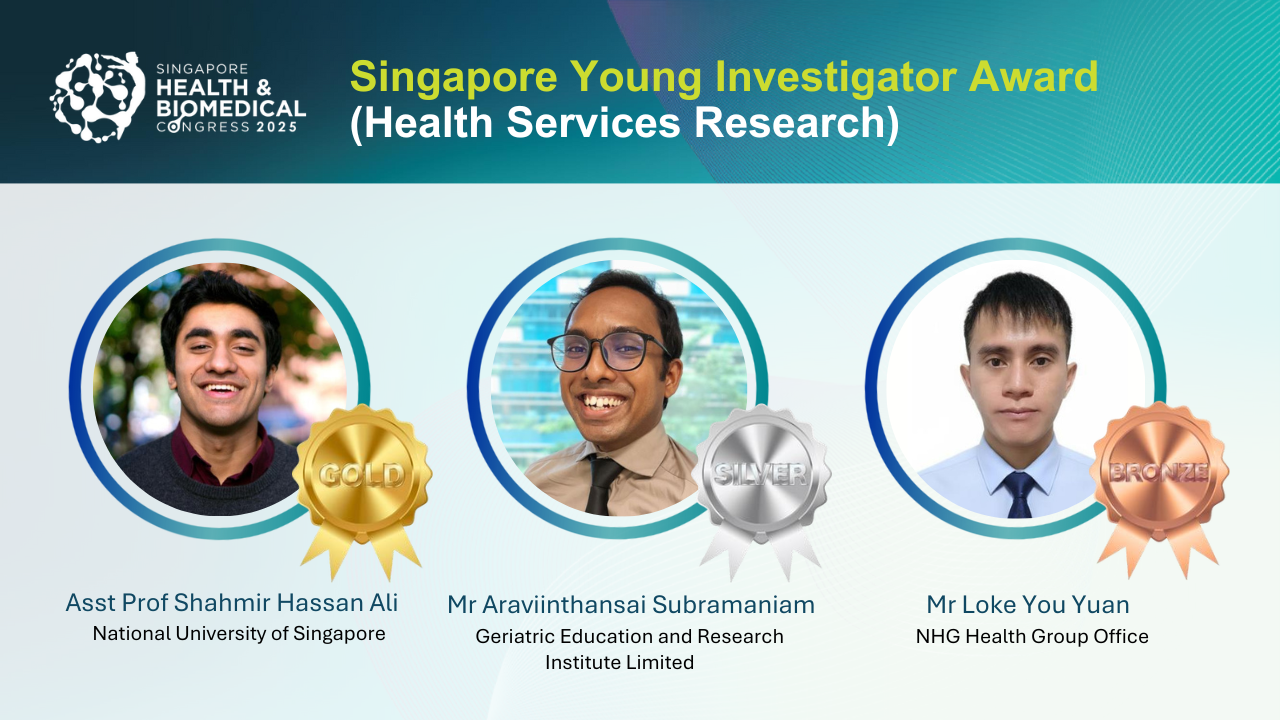
The study is led by Dr Justin Chew (Research & Innovation Lead, Institute of Geriatrics and Active Ageing and Consultant, TTSH) and Dr Grace Sum Chi-En (Research Fellow, GERI). INFA empowers nurses to screen and coordinate care for hospitalised older patients in non-geriatric wards with age-related health issues. The goal is to contribute towards building frailty-ready hospital services by informing practice and policy on frailty management.
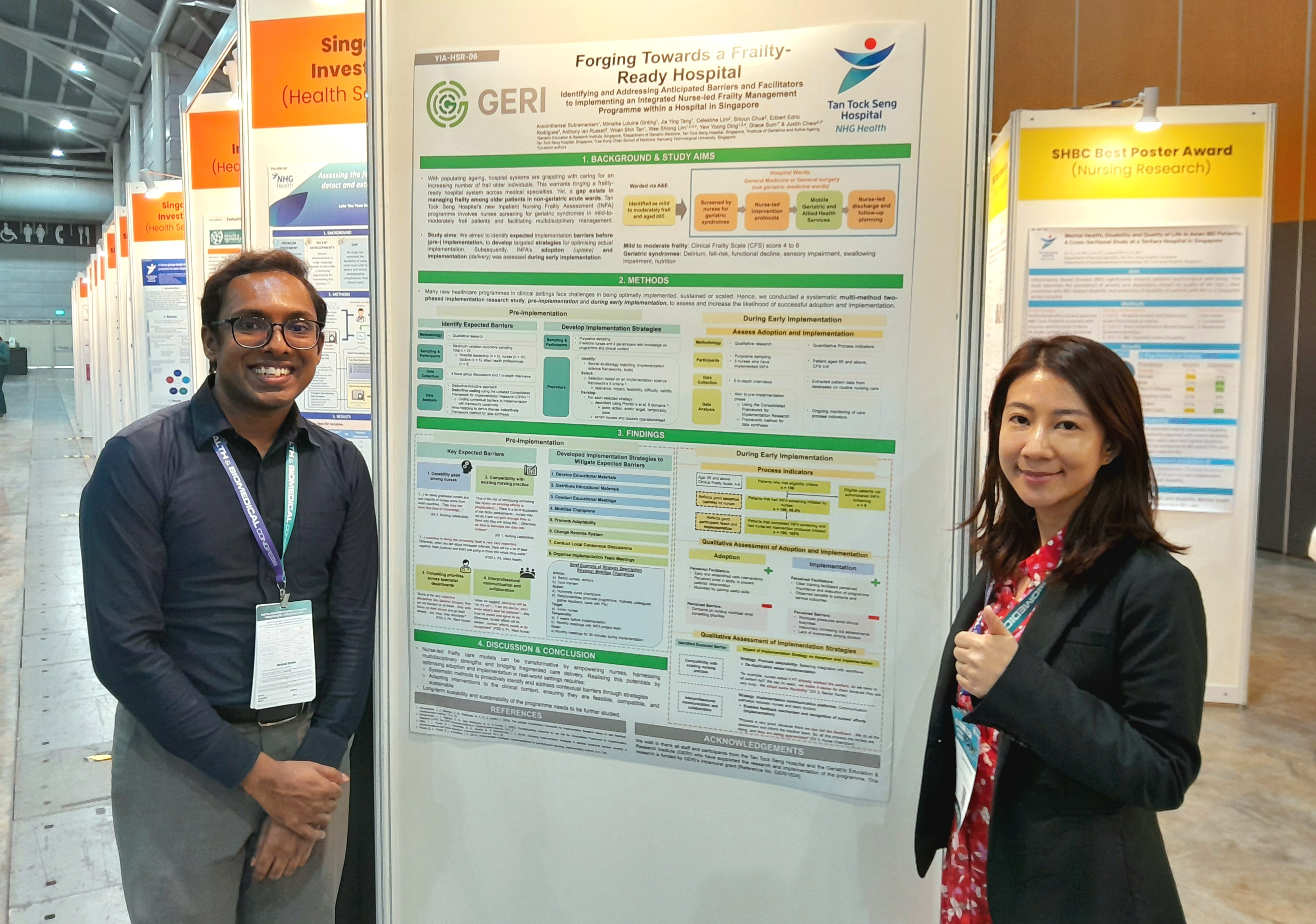
Araviinthansai Subramaniam, Research Associate and Dr Grace Sum Chi-En, Research Fellow
At the heart of this work, Araviin notes, is leveraging systematic implementation research approaches alongside early stakeholder engagements. The research team interviewed nurses, doctors and allied health professionals to identify expected implementation barriers before programme launch, informing targeted strategies which helped optimise INFA’s actual uptake and delivery.
By identifying barriers beforehand, we can develop targeted strategies for optimising actual implementation.— Araviinthansai Subramaniam, Research Associate
Three other studies were also showcased at SHBC 2025, demonstrating how GERI works with stakeholders to co-develop strategies to improve, sustain and scale up evidence-based interventions for healthy ageing.
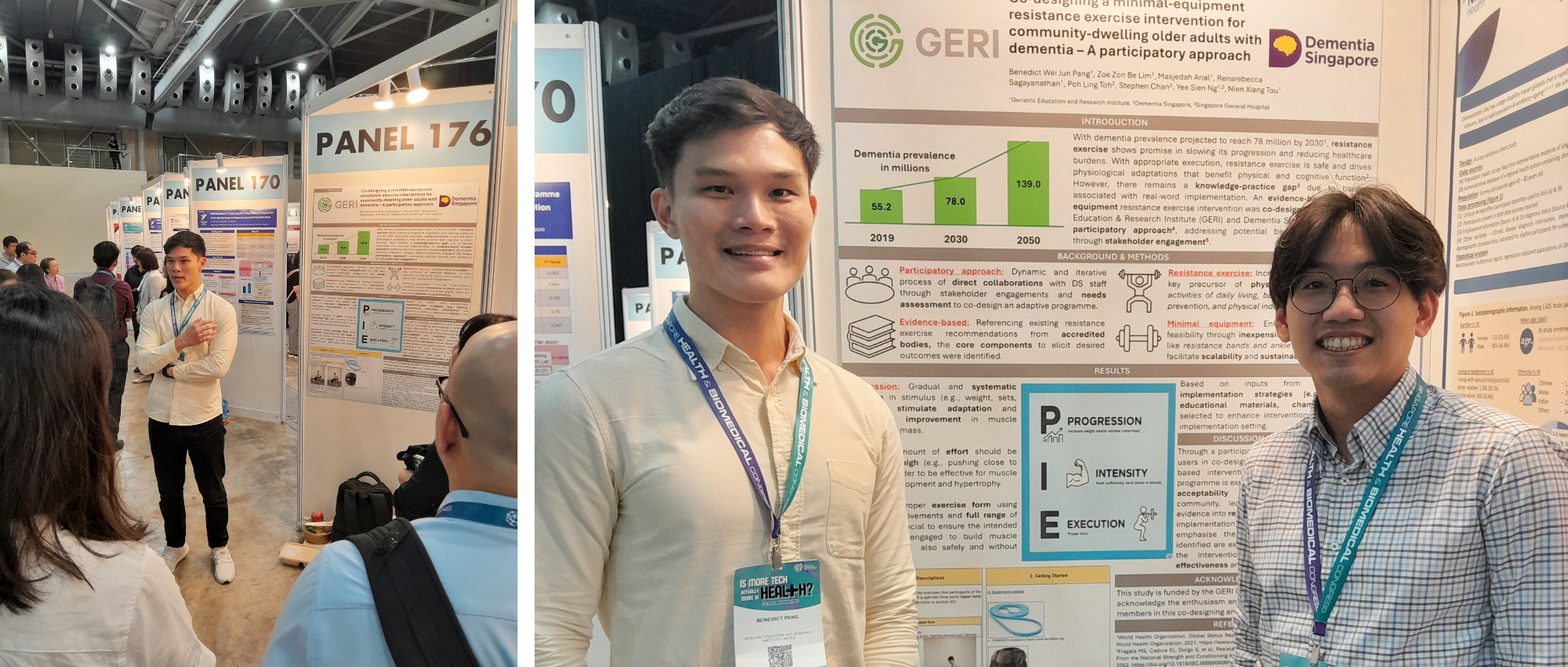
Dr Benedict Pang, Research Fellow and Dr Tou Nien Xiang, Research Fellow and Principal Investigator
Dr Benedict Pang, Research Fellow, GERI shared findings from the co-design phase of a Type I implementation and effectiveness hybrid pilot study on a minimal-equipment resistance exercise intervention for community-dwelling older adults with dementia.
His poster showcased the study team’s participatory approach in co-designing the exercise programme and accompanying manual with stakeholders from Dementia Singapore. Involving key stakeholders and knowledge end-users in the co-designing process enhances the acceptability and feasibility of the programme within the desired context (in this case, dementia day care centres).
Prioritising stakeholder inputs, coupled with an evidence-based approach, are expected to lead to preferential effectiveness and implementation outcomes.— Dr Benedict Pang, Research Fellow
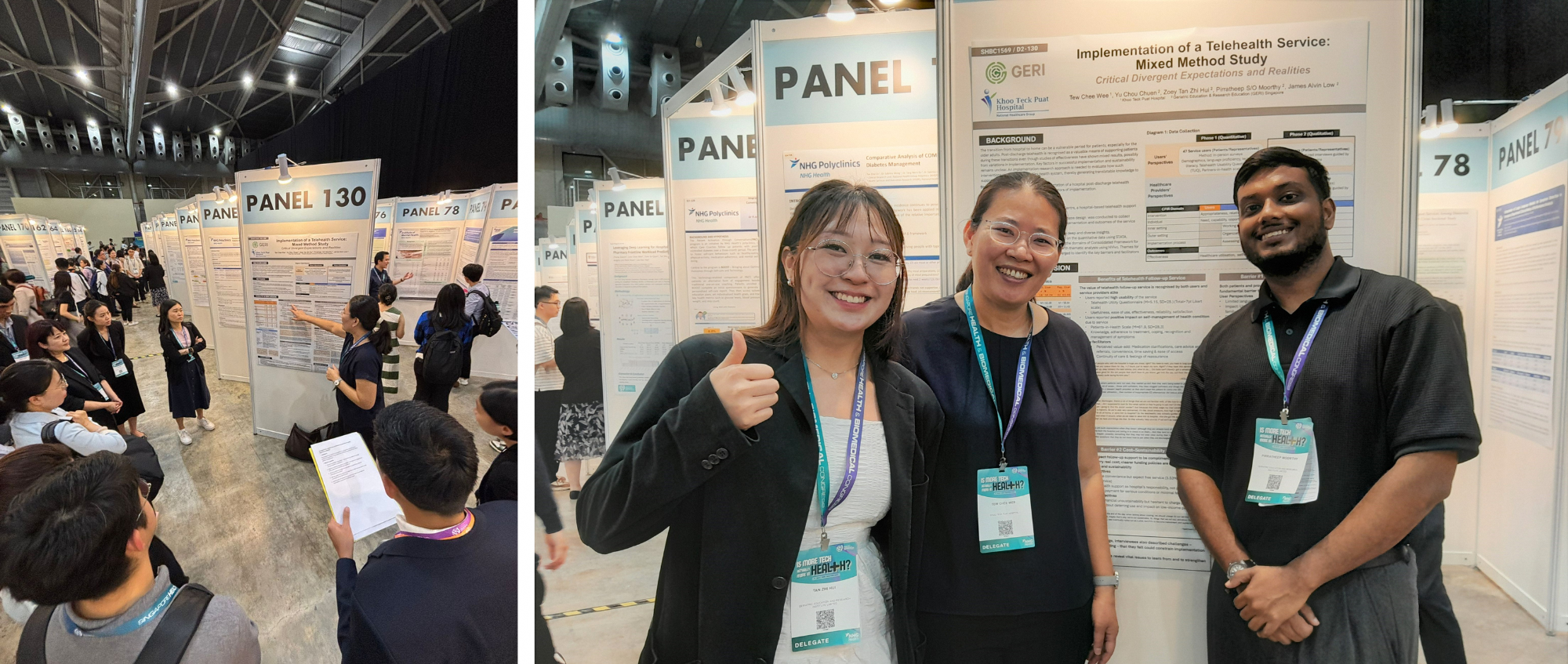
Dr Tew Chee Wee, Principal Investigator with the THINK study team
Dr Tew Chee Wee, Visiting Consultant, GERI and Senior Consultant, Geriatric Medicine, Khoo Teck Puat Hospital and Yishun Community Hospital shared findings from an evaluation of a post-discharge telehealth follow-up service.
The study team found that while the value of the telehealth service was recognised by both users and healthcare providers, inadequate language support was a fundamental barrier that could significantly impact telehealth effectiveness, necessitating enhanced service language capability for all four main languages.
A funding model that bridges the gap between expectations of free follow-up service and operational costs, while ensuring affordability, is critical for the long-term sustainability of the service.
While telehealth has broad applications post-discharge, its effectiveness depends on balancing clearly defined targets with flexible delivery that adapts to patients' needs and resources.— Dr Tew Chee Wee, Principal Investigator
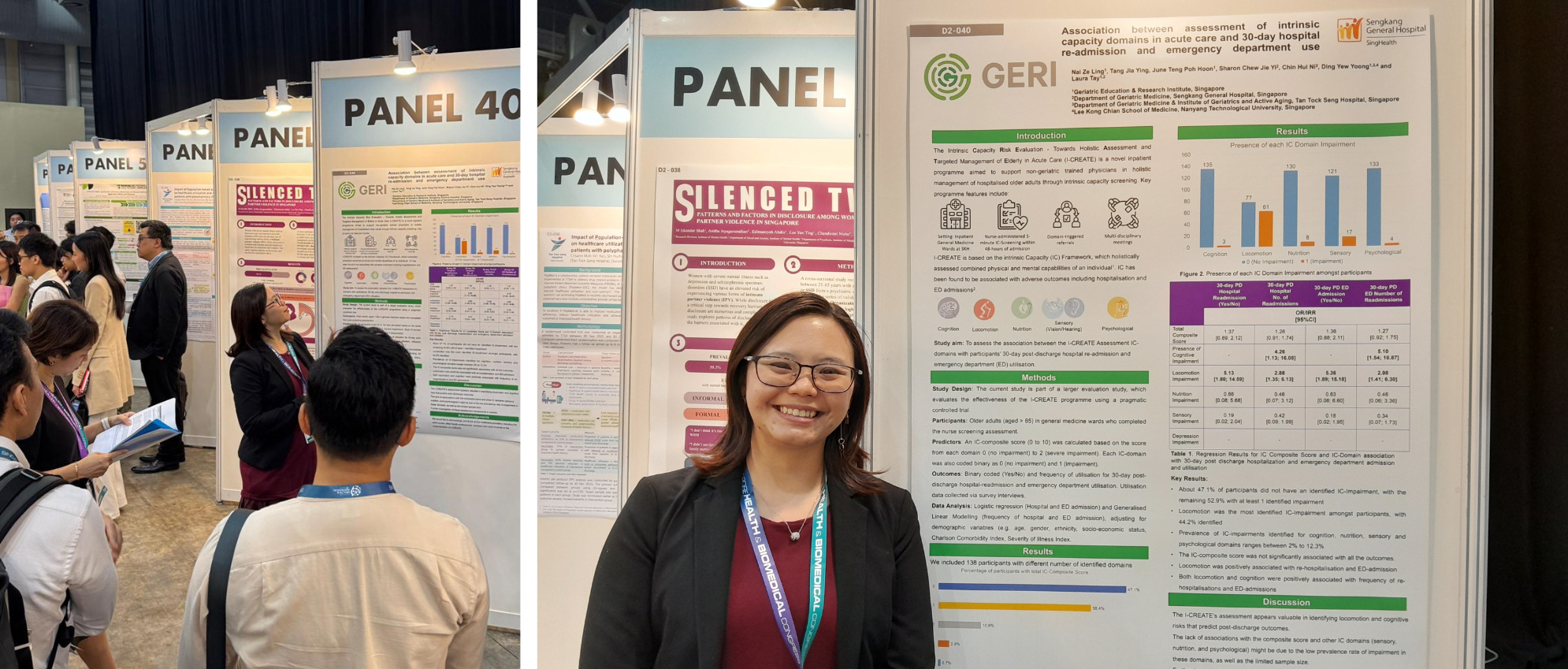
Dr Serene Nai Ze Ling, Research Fellow
Dr Serene Nai Ze Ling, Research Fellow, GERI shared updates from a study with Sengkang General Hospital that aims to assess the association of identified intrinsic capacity (IC) domains with 30-day post-discharge hospital and emergency department (ED) admission. The analysis conducted as part of an IC screening programme conducted in an inpatient setting, where patients with IC domain impairments are referred for follow-up care.
The team’s findings suggest that participants with identified locomotion domain impairment were more likely to be admitted to the hospital and ED. Locomotion and cognition domains were also positively predictive of the number of hospital and ED admissions.
Follow GERI on LinkedIn for more updates on our researchers in action.
